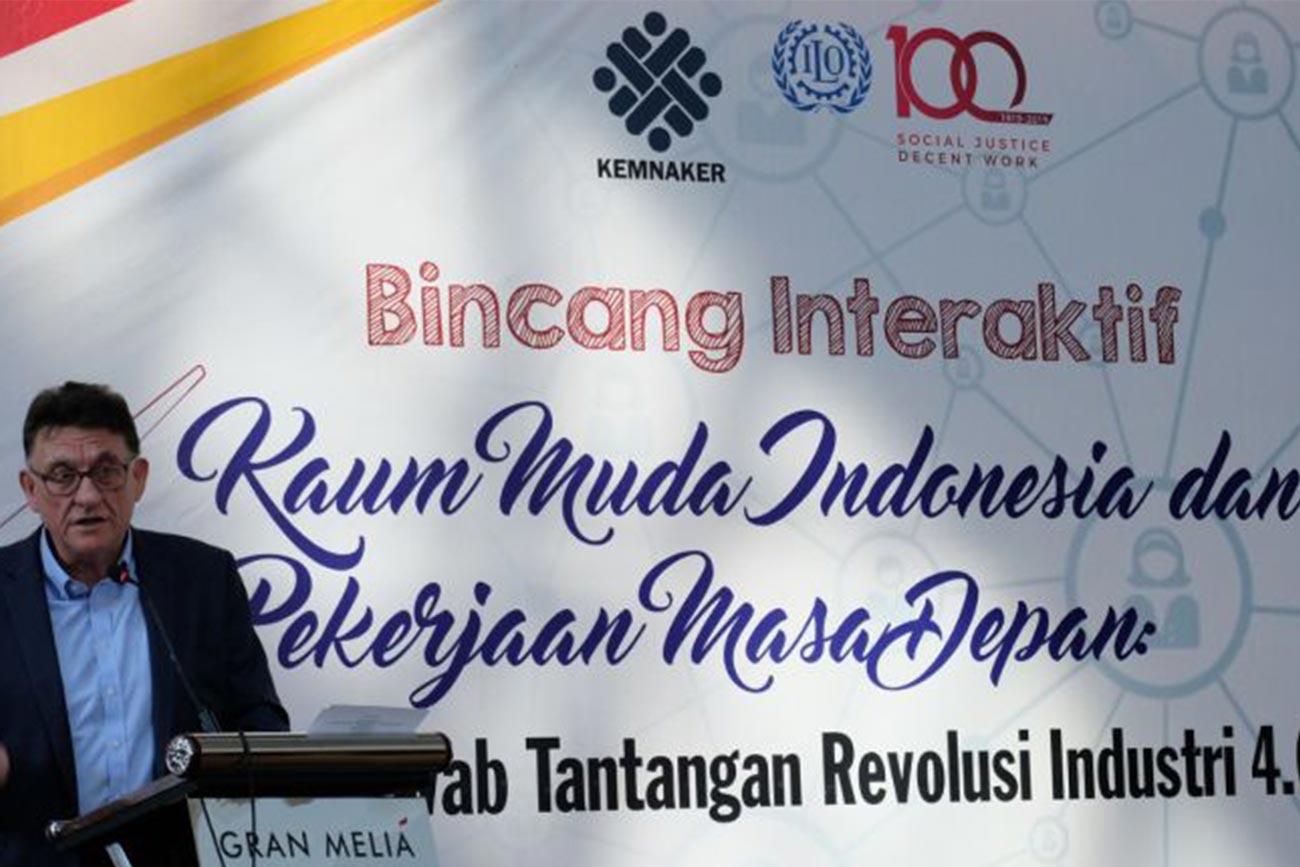Young entrepreneurs make the best use of technology as business opportunities

Young people are at the heart of the digital age. They think with and through new technologies.
Five young digital entrepreneurs shared their businesses at the interactive discussions titled “Youth and Future of Work: Answering the Challenges of Industrial Revolution 4.0” held in Jakarta. The event was conducted by the ILO in conjunction with the celebration of the 100th anniversary of the ILO.
Greg Vines, Deputy Director-General of the ILO, who visited Indonesia for the celebration of ILO 100 in the country, emphasized opportunities given by the digital era. Although a number of works were going to be lost, new types of jobs would be emerged.
“The crucial point is the future of work can and must be an outcome of our own actions, of human interventions. It means that the technology includes working lives rather than reducing workers’ control over work processes,” he said in his opening remarks.
Meanwhile, Bambang Satrio Lelono, Director General for Placement, Training and Productivity of the Ministry of Manpower explained that “the Ministry has implemented a triple skilling approach, aimed to support and facilitate manpower in the training programme at the Vocational Training Centre (BLK). We focus on the vocational trainings providing skilling, re-skilling and up-skilling.”

Five young digital entrepreneurs shared their businesses at the interactive discussions titled “Youth and Future of Work: Answering the Challenges of Industrial Revolution 4.0”
Representing young entrepreneurs taking the digitalization as an opportunity, Enrico Hugo and Nicholas Ng, founders of Cause, a virtual platform, decided to utilize the technological advancement by establishing a virtual run platform. “I see an opportunity to establish a virtual run platform where people can contribute to the social cause by running,” told Enrico; while Nicholas added that the technology has helped them up-scaling their platform.
For Dimas P. Muharam, a founder of Kartunet.com, the technology has inspired him to open a website for people with disabilities, particularly for blind people. “Technology has transformed disability into ability. The industrial revolution 4.0 is not a challenge, it is actually an opportunity as it has opened wider access for us,” he stated.
Gender was not a constraint for Tri Handayani, founder and CEO of Rayyan Construction, to lead a male-dominated company where she was the only woman. “By utilizing the current technology, we develop construction innovation in eco-projects. We develop eco-house, eco-renovate, eco-construction, eco-commerce and so forth,” she said.
However, she admitted that at the beginning she did not get support from her family to build her own business. “I show my family that I can do this and now I really get their full support. I also show them that I can lead my team although all my employees are men,” she added.

From left to right: Diovio Alfath, Founder and Executive Director of Sandya Institute, Tri Handayani, founder and CEO of Rayyan Construction, Enrico Hugo and Nicholas Ng, founders of Cause, Doni N. Pranama, Senior Strategic Development of Tokopedia, and Dimas P. Muharam, a founder of Kartunet.com
Doni N. Pranama, Senior Strategic Development of Tokopedia, a technological company and one of the Indonesian unicorns, underscored the benefits of internet for businesses. “Seventy percent of our vendors are first time entrepreneurs. With better and wider access to the internet, they are now able to open their online shops and to start their businesses. The technological advancement has made this possible.”
The interactive discussion was moderated by Diovio Alfath, Founder and Executive Director of Sandya Institute. Before more than 100 young participants from various youth organizations and universities, he concluded the interactive discussion with notions that young people of Indonesia should see today’s fast changing world as opportunities.
“The changes brought by technology is unavoidable. Therefore as a young, vibrant generation of Indonesia we have to be innovative and always seek for opportunities as shown by today’s inspiring speakers. The most important thing is that we never stop learning,” he concluded.



